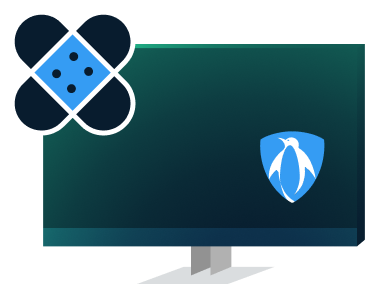Fast patch delivery that comes with an SLA guarantee for critical vulnerabilities and exposures (CVEs)
TuxCare’s Upcoming Webinars: STIG Security 101 [Sept 18th] & When Spring Ends: How to Securely Work with End-of-Life Spring Projects [Sept 19th]
CentOS 8 patches delivered
by TuxCare since EOL
CentOS 8 is now, of course, officially end of life. But if you’re still
running it now, relax. You have a safe haven for CentOS 8 at TuxCare,
giving you as much time as you need to execute and plan your migration.

We’ve been supporting older versions of Linux for years, and today over 100,000
end-of-life Linux nodes are getting cybersecurity updates and fixes from TuxCare.


What happened with
CentOS EOL?
In December 2020, Red Hat Software, the sponsor of the CentOS community release, changed course and advised the Linux community that it will stop producing stable releases of CentOS Linux. CentOS 8 would be the last release that is 1:1 binary compatible with a Red Hat Enterprise Linux release.
Only the rolling release, CentOS Stream, would now continue to be developed by Red Hat. At the same time, Red Hat advised system administrators that CentOS 8 would reach end of life in Dec 2021 – years earlier than expected.

What are the
consequences?
For many workloads, CentOS Stream cannot function as an enterprise Linux solution because a rolling release doesn’t give enterprise users the time to battle test new operating system versions. By cutting official support for CentOS 8 short and with no release date for a new version, Red Hat put many companies in a difficult position.
Enterprise users and web hosts needed to choose between a risky, rapid transition to an alternative commercial or community release such as AlmaLinux, Rocky Linux, or Ubuntu – or taking unacceptable risks in running unsupported Linux systems.
What is Endless Lifecycle Support?
Endless lifecycle support is a simple concept that buys you time to migrate to an alternative Linux distribution. It’s straightforward: as soon as a new
security vulnerability is found or if bug fixes are needed, TuxCare immediately develops a patch that you can deploy across your Linux systems using
traditional package management tools. We don’t wait for the vendor to release a patch. Instead, we rely on our experienced in-house developers to
analyze the vulnerability, rapidly releasing a patch that’s just as effective as the official vendor patch.
TuxCare gives you exactly the same critical updates and patches
you would get if you still had official vendor support, including:


Access to 24/7 support services thanks to a ticket system, alongside technical account management

Rebootless service installation, making sure your infrastructure remains always available

Patches produced by a team with over a decade’s experience in developing and maintaining RHEL-based derivatives

An easy-to-swap-into-place solution that offers full compatibility with current infrastructure

Peace of mind because your end-of-life CentOS 8 systems keep running securely
Switching to Endless Lifecycle
Support is as easy as 1-2-3
It’s quick and easy to enable Endless Lifecycle Support across your CentOS 8 fleet. All it takes is running a short script on your Linux servers, and you’re up and running with TuxCare’s end-of-life support for CentOS 8.

Supported components
You can rely on TuxCare to continually update kernel, Apache, PHP, glibc, OpenSSL, OpenSSH, and Python packages. This includes ...
- acpid
- glibc
- attr
- php
- info
- Iptstate
- gdb
- glib2
- bash
- basesystem
- authconfig
- zlib
- acl
- ed
- lslk
- blktrace
- bc
- openssh
- device-mapper
- dhclient
- dhcpv6
- bzip2
- busybox
- bridge-utils
- httpd
- userspace packages
- crash
- cyrus-imapd
- cyrus-sasl
Frequently Asked Questions
The official vendor support for CentOS 8 has now been discontinued. If you have any workloads still relying on CentOS 8 you won’t receive ongoing vendor updates. When a new vulnerability for CentOS 8 surfaces – and it will – you won’t get a fix, and your systems will be vulnerable to the resulting exploit.
However, you can sign up for TuxCare’s Endless Lifecycle Support (ELS) to cover you for security fixes for CentOS 8 for as long as you need, just the same way Red Hat support would cover you, if it was still available.
Yes, but you need to find a way to ensure that you apply critical security patches. You can develop these patches in-house if your organization has the required Linux server kernel development expertise.
Your alternative is to partner with a vendor that can provide these patches for you. With TuxCare’s Endless Lifecycle Support you can continue to use CentOS 8 for as long as you need. However, you cannot continue using CentOS 8 on production systems without third-party support.
There are two parts to this answer. The CentOS project is continuing in the shape of CentOS Stream, a CentOS version that is a rolling release, continuous delivery Linux distribution that is essentially a preview of the regular RHEL stable releases issued by Red Hat.
The change lies in that there will no longer be new releases of a fixed, stable version of CentOS. With the respect to workloads that relied on binary compatibility with RHEL, CentOS 8 is now discontinued as the rolling release CentOS Stream will not be binary compatible with the latest RHEL release.
CentOS Stream is the replacement for CentOS 8. For some members of the CentOS community, CentOS Stream would be a suitable replacement for their workload, for example in some scientific or development environments or where just one or two machines are involved.
However, CentOS Stream’s rolling release nature means it’s not a replacement for many enterprise production workloads; or for web hosts who are CentOS users. And, in that sense, there is no direct replacement for CentOS 8, though alternative Linux distros include AlmaLinux, Amazon Linux, Oracle Linux, Rocky Linux, or even Ubuntu.
We support CentOS 8.4 and 8.5 Stable – For this and other distro support, please see: https://docs.tuxcare.com/els-for-os/
Talk to a TuxCare Expert
Tell us your challenges and our experts will help you find the best approach
to address them with the TuxCare product line.
 Documentation
Documentation Login
Login













